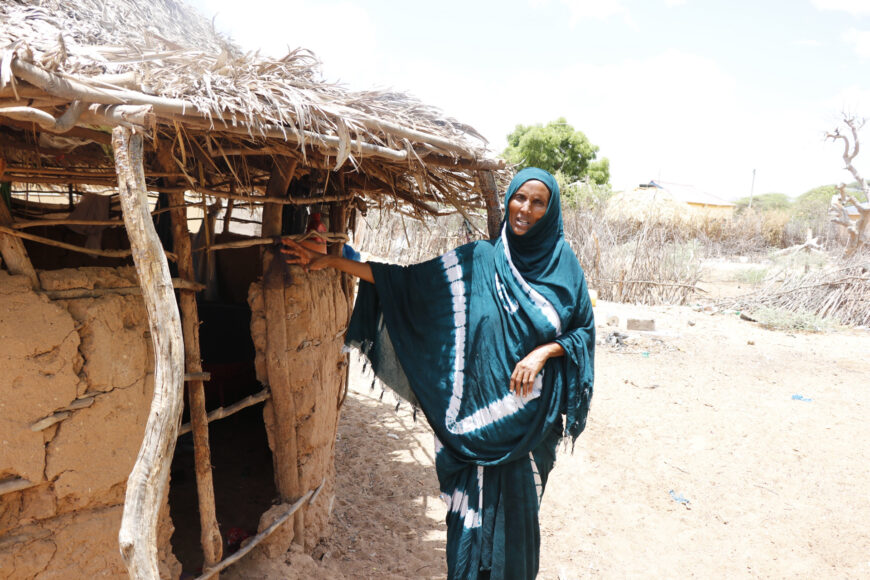In October 2023, Kenya was hit by severe flooding that lasted about two months, causing significant damage. The floods have resulted in the loss of at least 1,781 lives and the displacement of over 64,000 households.
The massive destruction of infrastructure has severely affected the livelihoods of communities, especially those in the Arid and Semi-Arid Lands (ASALs), where agro-pastoral communities are located. The floods have led to significant losses in livestock and businesses, which has further worsened the already high poverty rates in the region. In fact, over 95% of household incomes in ASALs depend on livestock.
Unfortunately, the floods have made the humanitarian crisis in the region even worse, as the region was already struggling to recover from the worst drought in four decades, which had left millions of people hungry.

In the remote village of Kasha, located within Garissa County, resides a woman named Muhktar Yusuf*. She is a 52-year-old widow and mother of five who has persevered in the face of poverty and sustained vulnerability throughout her life.
For Muhktar, daily life was a struggle to provide for her family’s basic needs, especially during natural disasters like frequent floods that ravaged her village. However, her situation improved when she became a beneficiary of the Locally led Multipurpose Cash Transfer Program. Around the Ramadan period, she received KES 11,530 through the program led by Acted and funded by the Norwegian Ministry of Foreign Affairs (NMoFA), in collaboration with the Pastoralist Girls Initiative.
The cash transfer was a lifeline for Muhktar and her family, who could now buy food and essentials. Moreover, the funds enabled her to pay off her debts and school fees, as well as cover her medical expenses.
The cash transfer has truly uplifted our livelihoods. We got it when we needed it the most.
The impact of the cash transfer rippled throughout the community, catalysing social and economic empowerment. As debts were repaid and livelihoods bolstered, the village witnessed a resurgence of hope and prosperity. Mukhtar’s small kiosk underwent a transformation, symbolizing her resilience and determination to make things work for her family.
Her story is but one testament to the transformative power of collective action. The cash transfer has helped the members of the concerned communities to remain resilient and endure the hardships they are faced with due to unpredictable climate shocks. Furthermore, the program also shows that it can have transformative and enduring long-term benefits on communities as a whole, with the example of repaying debts and fostering trust among community members.
I have paid all my previous debts, and the shops can know give me goods on credit, because they trust that I will pay them.
A lifeline for poverty-stricken communities
Muhktar is not the only beneficiary with a story to tell in Garissa County, where the challenges of pastoral life intertwine with unpredictable forces of nature. Zahara Omar1 and her family faced the challenges head on, remaining resilient.
Their home, located at Saka junction, bore witness to the harsh realities of floods, leaving them stranded and on the brink of despair. Despite her efforts to sell milk to sustain her family, the calamity of the floods pushed them to their limits. Her father’s illness only added to their burden, exacerbating their already dire situation.
Zahara utilized part of the cash she received to settle the piling medical bills for her ailing father, ensuring he received the urgent care he needed. The assistance a lifeline for her family.
The cash transfer is such a big relief to us. We managed to find relief with the cash transfer.
An administration official, Chief Ramu reiterated her sentiments, emphasizing the transformative impact of the program on the community.
In the face of difficulty, Zahara and her family Through the support of the Multipurpose Cash Transfer Program, they not only weathered the storm but emerged with opportunities.
The cash program is truly beneficial. The community can allocate it to various necessities such as food, health, and education
Acted, the ASAL Humanitarian Network (AHN), and other partners are providing a coordinated and harmonized Multi-purpose Cash response to meet the basic needs of communities affected by climatic shocks – drought and flooding in the ASAL communities in Northern Kenya. Through the consortium, more than 5,000 households have been able to enhance their food security and purchasing powers and thus improving their food consumption, dietary diversity, and a reduction in negative coping strategies.
*Beneficiaries’ names have been changed to protect their identity.